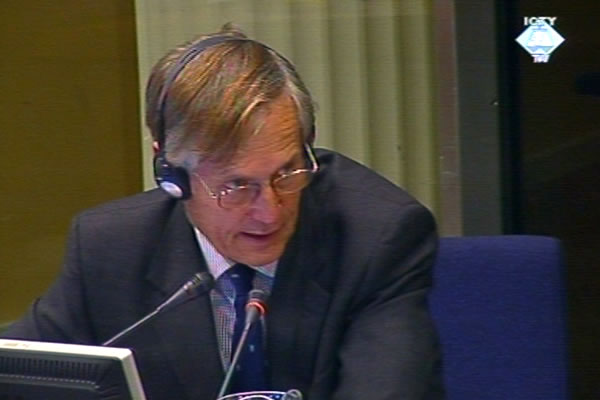Home
KARADZIC – NATO WAS “TRIGGER HAPPY”
Radovan Karadzic continued his cross-examination of General Michael Rose, putting it to him that NATO was ‘trigger happy’ and eager to fire on Serbs. Karadzic countered General Rose’s claims, saying that the Serb troops were not against the humanitarian aid deliveries to protected areas. When Karadzic claimed that only 3 to 5 percent of humanitarian convoys had problems crossing the Serb lines, Rose said it was ‘nonsense’
 Michael Rose, witness at the Radovan Karadzic trial
Michael Rose, witness at the Radovan Karadzic trial After UN Secretary-General’s personal representative Yasushi Akashi approved his request, British general Michael Rose issued an order on 10 April 1994 which resulted in the first engagement of NATO ground forces from the Alliance’s establishment. The targets were Bosnian Serb positions around Gorazde.
Continuing his cross-examination of General Rose, former Republika Srpska president Radovan Karadzic put it to him that NATO troops were ‘trigger happy’ and that the ‘United Nations were in fear because NATO was so eager to open fire on Serbs’. Rose replied that in the UN, air strikes were considered ‘as an ultimate measure’, not to be taken unless the lives of people inside the protected zones were in danger. This was the case in Gorazde.
General Rose said that the Serb troops blocked the roads to prevent the delivery of humanitarian aid to protected areas in BH. The UN peace-keepers could not do their key tasks as a result. In this context, the issue of military action had to be considered, Rose said. The witness gave two ‘extreme examples’ when the peace-keepers had to use force to get a convoy to pass through the Serb territory. In January 1994, NATO forces were called in to intervene when a convoy was prevented from leaving Kiseljak. Serb forces withdrew before NATO went into action. On the second occasion, UNPROFOR used Danish tanks to ensure safe passage of refugees from Zvornik.
When Karadzic asked Rose if he could agree that in 1994 only 3 to 5 percent of humanitarian convoys encountered problems passing through the Serb territory, Rose said it was ‘nonsense’. ‘If UNPROFOR had to use force or threaten to use force, it means there were continuous difficulties’, he said. General Rose estimated that the UN accomplished only about 50 percent of its objectives in terms of distributing humanitarian aid.
Karadzic, on the other hand, tried to show that the Serbs ‘didn’t invite attacks by blocking the roads; they blocked roads because of attacks’. Karadzic went on to quote an article by the Tanjug news agency, Mladic’s notes from a meeting with the international peace-keepers and his correspondence with Akashi in 1994. Karadzic put it to the witness that the Serb side was not against distributing humanitarian aid; they merely ‘had reasons for concern’ because ammunition and other supplies were smuggled in for the BH Army in convoys and convoys therefore had to be stopped and checked.
General Rose agreed that Serbs paid lip service to letting the convoys pass but he claimed the situation in the field was different. Although there were reasons for concern is some cases, they were not sufficient to justify stopping the convoys, in his opinion. As the hearing today drew to a close, Karadzic revisited the issue of NATO air strikes in Gorazde. As Karadzic claimed, NATO cooperated with the ‘Muslim army’ there. Rose denied this emphatically. ‘There was no cooperation whatsoever between NATO and the Bosnian government, and any such interpretation on your part is wrong, he said.
General Rose will complete his second testimony before the Tribunal tomorrow.
Linked Reports
- Case : Karadzic
- 2010-10-06 KARADZIC: NO RECONCILIATION IF WE SHELLED THE MARKALE TOWN MARKET
- 2010-10-05 HOW KARADZIC’S ‘GOOD DEED’ TURNED INTO EVIDENCE FOR PROSECUTION
- 2010-10-01 INTERCEPTS REMAIN IN EVIDENCE AGAINST KARADZIC
- 2010-10-08 KARADZIC HAD ABSOLUTE CONTROL
- 2010-10-11 THOUSAND DAYS OF UNCERTAINTY
- 2010-10-12 KARADZIC REJECTS SARAJEVO INVESTIGATIONS
